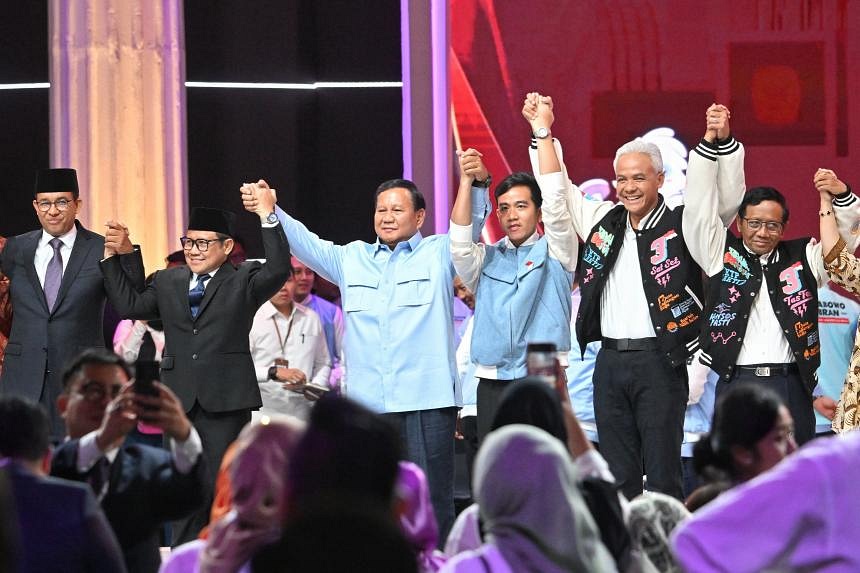JAKARTA – About 205 million Indonesians are eligible to vote for a new president on Feb 14. Here is a closer look at the three men vying to lead the world’s third-largest democracy.
Anies Baswedan
Mr Anies, 54, was born into a family of academics. He followed in his parents’ footsteps to become a lecturer. He led Paramadina University in South Jakarta at the age of 37, leaving his mark as one of Indonesia’s youngest rectors. Politics then beckoned.
He was culture and education minister between 2014 and 2016, and then served as Jakarta governor from 2017 to 2022.
But his path to becoming governor was controversial. In the race for the post, he accepted the endorsement of hardline Islamist groups that played the religious card against his rival, Mr Basuki Tjahaja Purnama, an ethnic Chinese Christian who was later jailed for blasphemy.
Mr Anies was praised for his Covid-19 response, but he has not solved the capital city’s perennial problems such as traffic congestion, flooding and air pollution.
He is not a cadre of a political party. He was first endorsed as a presidential candidate by the nationalist NasDem Party, which then joined forces with two Islamist parties, the Prosperous Justice Party and the National Awakening Party. He is running with the latter’s chairman, Mr Muhaimin Iskandar, 57.
The pair have pledged to create 15 million jobs to reduce unemployment, including by building an entrepreneurial ecosystem to create start-ups. Another key proposal of theirs is to develop 40 cities equal to Jakarta to spur regional economic growth, by upgrading infrastructure in second-tier cities.
They also aim to provide easy access to credit for house purchases, especially for people employed in the informal sector such as motorbike taxi drivers and freelance workers.
Prabowo Subianto
Will third time be the charm for Mr Prabowo?
Twice defeated in the 2014 and 2019 elections by President Joko Widodo, Mr Prabowo is determined to win this time, and has teamed up with Mr Widodo’s elder son as his vice-presidential running mate.
Mr Prabowo likes to project the image of a strongman. He is a retired army general and the current Defence Minister.
The 72-year-old is no stranger to politics and power, coming from an influential family. His father, Professor Sumitro Djojohadikusumo, was a notable economist and politician who held three different ministerial posts under the late presidents Sukarno and Suharto. The latter was also Mr Prabowo’s former father-in-law.
Mr Prabowo is also no stranger to controversy. As a special forces commander, he faced allegations of human rights violations linked to the kidnapping of democracy activists in 1997 to 1998, which he has denied.
He is well known for his temper, something he has tried to rein in on the campaign trail.
Endorsed by Gerindra, the party he co-founded and chairs, Mr Prabowo is running for the presidency with Mr Gibran Rakabuming Raka, 36, the mayor of Surakarta, popularly known as Solo.
Mr Gibran became eligible to run after a controversial court ruling that allowed those under 40 to contest the polls, provided they have served as elected regional leaders.
Mr Gibran and Mr Prabowo have vowed to continue President Widodo’s core programmes, such as the development of the new capital, Nusantara, in east Kalimantan.
Economic development is a key focus for the pair. They have suggested creating 19 million jobs by developing downstream industries in the mining, agriculture and fisheries sectors, and giving small businesses incentives like zero-tax and collateral-free credit.
They also aim to provide free lunches and milk to students and young children.
The Prabowo-Gibran pairing has a top electability rating against their rivals, latest surveys show.
Their electability is 51.8 per cent, while that of Mr Anies and his running mate, Mr Muhaimin, is 24.1 per cent, according to pollster Indikator Politik Indonesia.
Mr Ganjar Pranowo and his vice-presidential candidate, Mr Mahfud MD, are at the last spot with 19.6 per cent.
Ganjar Pranowo
Mr Ganjar, 55, is the son of a policeman, and has had to work harder than the other two candidates to woo voters unfamiliar with him. Yet, as a leader ascending from outside the political and military establishments, Mr Ganjar receives immense support from ordinary folk.
Despite his humble background, he rose to become the governor of Central Java, which has a population of about 37 million – more than the population of Malaysia.
His pro-democracy activism against the authoritarian regime led by strongman Suharto started when he was studying law at Gadjah Mada University, with Mr Ganjar protesting against a major dam project. He was then an MP representing the country’s largest party, the Indonesian Democratic Party of Struggle.
During his time as governor of Central Java from 2013 until 2023, he introduced policies to support farmers, including a fertiliser subsidy that was later emulated across the country.
He also cut the interest rate of micro-credit to help small businesses. Despite his programmes aimed at helping the poor, the province’s poverty rate at the end of his service remained higher than the national average.
Mr Ganjar and his running mate, Mr Mahmud MD, 66, formerly a chief security minister in Mr Widodo’s Cabinet, aim to create 17 million jobs if elected. They have proposed boosting agricultural production and developing downstream industries in the mining, agriculture and fisheries sectors.
They have also pledged to improve healthcare services and educational opportunities for poor families, particularly in remote areas. They also promise to provide free Internet access for students nationwide.


